The Messenger

ARTIST PROFILE
WHY THIS YOUNG THEOLOGIAN WAS DRAWN TO REFORMED EVANGELICALISM
P. 5 ARE CHURCH AND HOCKEY AT ODDS? P. 11
P. 6
IS THERE HOPE FOR PASTORS AND CHURCHES IN CONFLICT?
P. 16


ARTIST PROFILE
WHY THIS YOUNG THEOLOGIAN WAS DRAWN TO REFORMED EVANGELICALISM
P. 5 ARE CHURCH AND HOCKEY AT ODDS? P. 11
P. 6
IS THERE HOPE FOR PASTORS AND CHURCHES IN CONFLICT?
P. 16
IN DECEMBER 2024, Canada’s Standing Committee on Finance issued a report with 462 recommendations. Item 430 recommends Canada “amend the Income Tax Act to provide a definition of a charity which would remove the privileged status of ‘advancement of religion’ as a charitable purpose.” Currently, the Canada Revenue Agency (CRA) provides four options from which an organization can select one to describe itself: relief of poverty, advancement of religion, advancement of education, and other purposes beneficial to the community.
According to the Evangelical Fellowship of Canada (EFC), Canada’s charitable and nonprofit sector is the second largest in the world. Of the more than 73,000 charitable organizations registered with the CRA, about 40% advance religion.1 Should this proposed recommendation be adopted by the current government, it could have profound effects on the ability of religious charities to contribute to the good of their communities.
A recent report from Cardus estimates that the socio-economic contribution of religious charities to Canada after subtracting $3 billion in tax exemptions is about $16.5 billion annually.2 That is, for every dollar a typical Canadian congregation spends, the local community receives $3.39 in socio-economic benefit, on average. Clearly, a cost-benefit analysis demonstrates that communities receive much more benefit from their local religious organizations than it costs them. Why, then, the disconnect between the good that religious charities actually do, and public perception? A Narrative Research poll in 2022 found that 35% of Canadians thought churches should
1 www.evangelicalfellowship.ca/Get-involved/ Support-the-EFC/Appeal-letters/2025/Churches-andCharitable-Status
2 www.cardus.ca/research/spirited-citizenship/ reports/why-religious-tax-exemptions-benefit-allcanadians
lose their charitable status, while 37% thought they should keep it (the rest were indifferent). So, when faced with a possible loss of charitable status, what’s a church to do?
One option is advocacy. Both the EFC and the Canadian Council of Christian Charities (CCCC) have already written to the Finance Minister objecting to the recommendation. Church members can also write to their local Member of Parliament in support of advancing religion as a charitable purpose. EFC has a sample letter at evangelicalfellowship.ca/protect-charitable.
Another option is better, more intentional communication on what religious organizations actually provide to their communities—benefits that would be curtailed by a loss of charitable status. It may be time for more “Let your light shine before others, that they may see your good deeds and glorify your Father in heaven” (Matthew 5:16) and less don’t “let your left hand know what your right hand is doing” (Matthew 6:3). And if some Canadians think “religious congregations are essentially clubs, primarily benefiting their own members” (Cardus report), we may need to ask ourselves if there is any truth to this.
A third option is to prepare for the possible loss of charitable status. With the secularization of society, perhaps this shift is inevitable. There are signs of hope, however. In the poll mentioned above, the strongest support for charitable status of religious organizations was among young people.
Whatever option we choose, above all let’s ensure that we glorify God and gain the respect of accusers by living honorably as Peter instructs (1 Peter 2:12) and give generously as God enables—regardless of whether we are rewarded with a donation receipt.
– Rebecca Roman,
Editor

Artist Profile
Dabbling to greater fulfillment
By Jen Kornelsen
6 11 16
Why this young theologian was drawn to Reformed evangelicalism
By James Driedger
A pastor explains why he found Reformed evangelicalism appealing, and where he finds himself now.
Are church and hockey at odds?
By Craig Cornelsen
While there’s more to life than playing and following sports, what are some of the benefits to the church?
Is there hope for pastors and churches in conflict?
By Earl Unger
With years of experience to share, a longtime pastor describes how churches and pastors can learn to disagree agreeably.
Global impact Partnerships: Questions that need answers
By Gerald Reimer
His light to my path Have you ever heard of Horatius Bonar? By
Karla Hein
Further in and higher up Things we’ve heard once too often By Layton
Friesen
Inspiring faith
Growing engagement with Scripture By Mo Friesen
Editorial
Letters and Notices
Global Focus
Local Focus News
Books & More
Shoulder Tapping
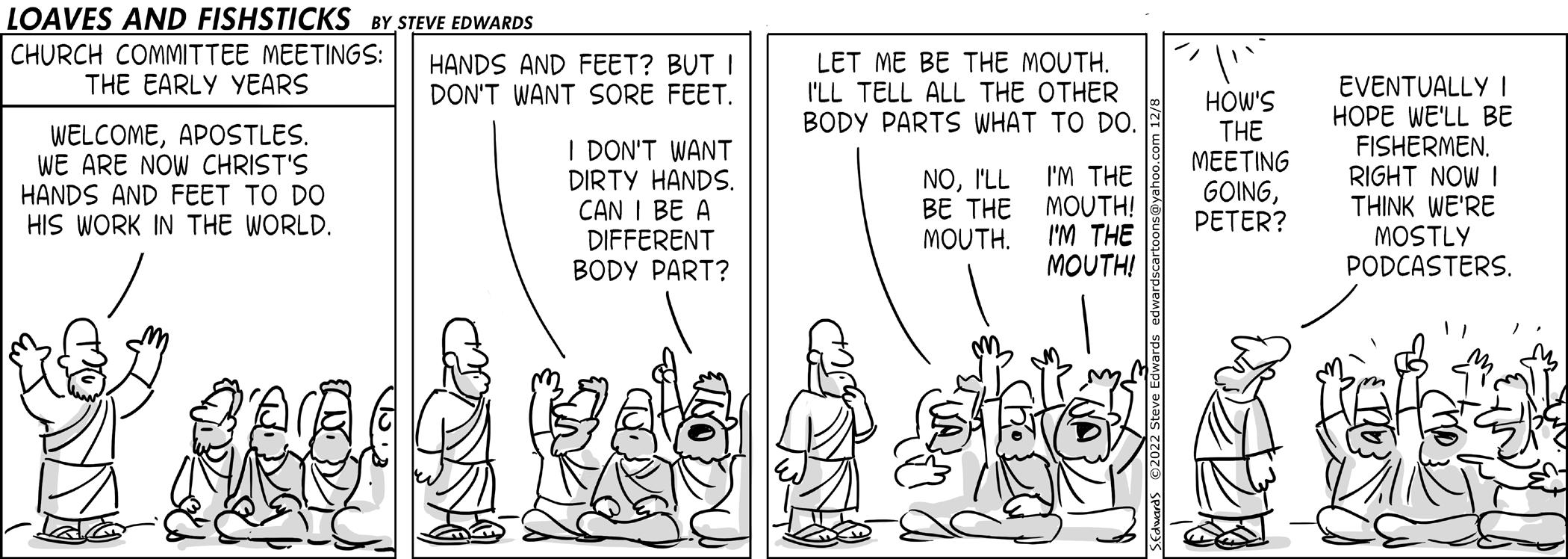
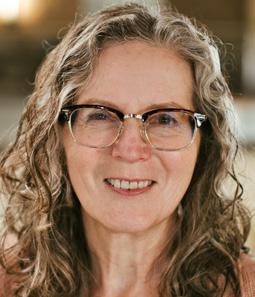
MANAGING EDITOR
ERICA FEHR

EDITOR
ROMAN
PUBLICATION AND PURPOSE
The Messenger is the publication of the Evangelical Mennonite Conference, 440 Main Street, Steinbach, MB R5G 1Z5. Its purpose is to inform concerning events and activities in the denomination, instruct in godliness and victorious living, inspire to earnestly contend for the faith.
Phone: 204-326-6401 messenger@emconference.ca www.emcmessenger.ca
ISSN: 0701-3299
Publications Mail Agreement Number: 40017362
Second-class postage paid at Steinbach, MB
COPYRIGHT
The articles printed in The Messenger are owned by The Messenger or by the author and may not be reprinted without permission. Unless noted, Scripture quotations taken from The Holy Bible, New International Version® NIV®, Copyright © 1973, 1978, 1984, 2011 by Biblica, Inc.TM Used by permission. All rights reserved worldwide.
SUBMISSIONS
Views and opinions of writers are their own and do not necessarily represent the position of the Conference or the editors. Advertising and inserts should not be considered to carry editorial endorsement.
Letters, articles, photos and poems are welcome. Submissions should be sent to messenger@emconference.ca
CHANGE OF ADDRESS AND SUBSCRIPTIONS
Print subscriptions are free of charge to all members and adherents of EMC churches in Canada. For those not associated with an EMC church we suggest a donation of $20.00/year.. To sign up for the email newsletter or submit an address change, email messenger@emconference.ca
ADVERTISING
The Messenger does not sell advertising, but provides free space (classified and display) to enhance our Conference, its churches, boards and ministries; inter-Mennonite agencies and educational institutions; and the wider church. Ads and inquiries can be sent to messenger@emconference.ca
evangelical mennonite conference
We give thanks to God for the continued strong support of EMC ministries, and we acknowledge the contributions of EMC churches and individuals who give so generously.
– The Board of Trustees
*Income includes donations and transfers from other funds (e.g., estate funds).

www.emcmessenger.ca
“I fear I would have been in the ‘crucify him’ crowd” p. 2, Mar/Apr 2025 issue
Humbling food for thought. Thank you for this!
Guidelines for letters Letters (250 words or less) are generally to comment on issues raised in The Messenger. The magazine reserves the right to edit letters for length, style, legality, and taste. It can refuse publication.
Thank you, Erica! I appreciate this— it resonates with me. Our faith asks us to hold both of these together: the recognition of our limitations and the confidence in Jesus our King. May we faithfully continue to offer ourselves up to him, trusting Jesus for how his kingdom works.
– Glenda Friesen
– Barbara Batulla The EMC national office will be hiring! Due to the upcoming retirement of EMC Director of Communications Erica Fehr, the EMC national office will be hiring. Position details and application information coming soon. To be notified when the position is open, sign up to receive the EMC Today newsletter at www.emconference. ca/subscribe.

Jen Kornelsen, with brushes in hand, ready to get to work.
I LOVE TO dabble in different creative projects. Whether it’s carpentry or gardening or cooking or painting—it all brings me great fulfillment.
Artists often talk about the deep meanings in their work and l feel a bit sheepish to say that I don’t usually have a very deep meaning. I often begin a creative project with just the simple thought that the result might be beautiful, or that I’d like to see certain colours together.
I wonder if this is a little like how God felt when he created the world. Maybe once God had created the colour green for the first time, he decided that it was his favourite colour and so he used every possible shade of it to blanket so much of the land. And when he had completed each element of creation, he looked on it with great satisfaction, declaring that it was good. God experienced such fulfillment in his creative work that he imparted creative gifts to the people that he made. And so, I feel like I am a little bit like my Creator when I make something, and I experience the pleasure of it.

Some of my paintings have an element “below the surface.” I seem particularly drawn to earthy stuff—browns and rusts and soil and minerals— the stuff we don’t see or look at much. I’m not sure why; I guess I embrace death and decay as a beautiful and miraculous part of life. We tend to hide those parts, but maybe it’s important to amplify them in order to recognize the part they play in a whole creation.
A favourite worship song of mine is sung from the perspective of planet Earth. If my art was viewed with a soundtrack, this song would be it!
“Declaring Glory” by The Porter’s Gate
New life begins
Your creatures dance across my skin
Like me, they have your Spirit within
But soon they fade away as I spin
They fall to dust
And dress me in decay and rust
Their secrets buried deep in my crust
I praise You in the layers of dust
Declaring glory, glory!
– Jen Kornelsen

About the cover photo: I see beauty in processes of change and even in decay. When I look at old iron and copper, I notice the interesting colours and designs made over time as these metals are exposed to the elements. Rust and oxidization produce brilliant patinas and contrasts. I wonder about the ways in which we ourselves are changed when under pressure, and what beauty God allows to result from pain and hardship.
By James Driedger
Editors’ note: This is the first article of a series The Messenger is commissioning on “the appeal of ... .”
Our request to writers was that they explain what it is they find appealing about other, not quite EMC, variations of Christian thought and practice. There’s nothing heretical here—rather these are convictions and worship practices we encounter as we visit other churches, listen to Christian programming or read Christian literature—and most of the time we barely notice, because, as Paul says, Christ is being preached, and these are our brothers and sisters.
Just as Rick Langer encouraged at the SBC leadership conference this past March, we need to understand what drives our differences. (See more on p. 28.) There is more behind our convictions than we can explain intellectually.
Our hope is that the series gives us insight into each other and leads to great conversations.
AT ONE POINT the title to Collin Hansen’s 2008 book Young, Restless, Reformed would have described me quite well. I was young (in my early 20s), restless (in many ways) and Reformed (drinking regularly from the well of the three Johns: Piper, Edwards and Calvin).
As an eager college student, I bought John Calvin’s twenty-two volume commentary set on the entire Bible (the 500th year anniversary edition of course). I laboured with much difficulty through Johnathan Edward’s philosophical works, such as “The End for Which God Created the World,” because I believed it would somehow be for my good. I visited Bethlehem Baptist Church in Minneapolis with hopes of hearing God glorified firsthand through the preaching of John Piper. And I planned to go to a flagship Calvinist seminary in the U.S. to sharpen these convictions.
I understand the appeal of Reformed evangelicalism not because it was the Christian tradition I grew up in (i.e., Anabaptism), and not because I felt pressured to do so (though a friend’s interest in the movement was also a pull factor). I did so because it genuinely appealed to me as a young adult in search of his theological moorings and because I wanted to think correctly about God. In this article, I intend to speak about the appeal of Reformed evangelicalism from this experience.
A word about terms. They can be tricky. In one sense, all Protestants are “reformed” because we are all descendants of the Reformation. But that is not how the term is typically used. At the risk of oversimplification, I will use the term in reference to the major branch within Protestantism known as Calvinism that began in the 16th century under the reformer John Calvin, and continues to find expression today in various church groups, perhaps most notably the New Calvinist movement which rose to prominence in the early 21st century and is the focus of Hanson’s book.
It goes without saying that I do not pretend to speak for even most people who are drawn to the Reformed expression of evangelicalism, although I expect some to find they can relate. But from my experience there were four factors that had a strong appeal to me in my theological journey.
The first is its rich pedigree. There can be no doubt about it, Reformed evangelicalism boasts of a pedigree rivalled only by the Catholic Church (primarily,
because 75 percent of church history belongs to it). While we can quarrel over who exactly belongs where, no one else claims to be the theological descendants of Martin Luther and John Calvin, Richard Baxter and John Bunyan, George Whitfield and Jonathan Edwards, Charles Spurgeon and Charles Hodge, Herman Bavinck and Abraham Kuyper, Karl Barth and Martyn Lloyd-Jones, J. I. Packer and Timothy Keller, never mind the many (and often popular) pastors and professors today who identify as either upper- (“R”) or lowercase (“r”) “Reformed” in their congregations and classrooms.
To use a term from the world of sports, this team is “stacked” with Protestant superstars. Reformed evangelicalism is the Team Canada of international hockey, trying to juggle around the likes of Sidney Crosby, Connor McDavid and Nathan MacKinnon. Who does not want to play for them, when it feels like almost every major theologian, missionary and pastor within the Protestant tradition is claimed as their “guy”? Pair this together with the tradition’s emphasis on God’s election of individuals for salvation (Ephesians 1:4), and you have (at its best) a strong sense of assurance that you are on the winning team, or (at its worst) an unmatched quality of arrogance about you that comes from believing you must be something special for having made this team.
Now, it is always dangerous to guess at someone else’s motives, which is why I don’t pretend to speak for anyone but myself. But whether one is driven by the simple desire to fit in, to be on the winning team, peer pressure to be on the right side of church history, theological FOMO, or the sense that the majority must be right when it comes to this question, one cannot deny that Reformed evangelicalism’s pedigree and aura of being the “winning team” is a drawing factor.
Connected to that, is the reality that the Reformed tradition offers a robust and comprehensive theological system through which to view, well, everything. Regardless of if one always finds their answers satisfactory, they have not left many theological stones left unturned. And what else
T U
I P depravity election atonement grace of the saints otal nconditional imited rresitable erseverance
would you expect with the roster of Protestant intellectual superstars mentioned above?
The Reformed tradition contains a rich reservoir of Christian thought that not only includes the Institutes and Church Dogmatics, but also the Belgic and Westminster Confessions of Faith, works like The Pilgrim’s Progress and The Book of Common Prayer that continue to shape the modern West’s language and imagination, and the present day output of reformed schools (Southern Baptist Theological Seminary), publishers (Crossway) and organizations (The Gospel Coalition) to name just a few. When it comes to leaving behind a depository of biblical and theological reflection, no other Protestant tradition can hold a candle to the quantity of material produced by the Reformed tradition—not least those who had to run for their lives for a few centuries before settling down.
Which is why as a young adult with minimal understanding of the state of theological discussion and development in the broader church, and the understanding I did have coming mainly from the charismatic organization I was a part of at the time, when I was introduced to the Reformed tradition, I felt like I was being offered a feast of the finest foods. As much as I love the charismatic church—and they truly are a gift to the body of Christ—I found it theologically lean in comparison to what Reformed theology had to offer. Not only did the Reformed tradition offer what felt like an endless buffet of biblical-theological answers to every question I could possibly imagine, but their answers carried a sense of objectivity in comparison to the subjective revelatory gifts I was accustomed to.
Reformed evangelicalism’s comprehensive theological system could not exist apart from their belief that the Bible can be easily read and understood. The Protestant principle of sola scriptura, which gives the Bible a privileged place of authority in all matters of life and faith, coupled with a belief in the perspicuity of Scripture (i.e., its clarity), has given the Reformed tradition a lot of confidence in reading and applying the Bible in every aspect of life.
Without denying the difficulties common to interpretation, Reformed evangelicalism believes, functionally, that the Bible says what it means and means what it says. From my experience, this means that their reading and application of Scripture tends to be more black-and-white.
Without denying the difficulties common to interpretation, Reformed evangelicalism believes, functionally, that the Bible says what it means and means what it says. From my experience, this means that their reading and application of Scripture tends to be more black-and-white, leaving less under the heading of mystery than what other traditions are comfortable with.
As such, they can almost never be faulted for playing loose with Scripture or treating it lightly. Compared to some of their more progressive evangelical peers, Reformed evangelicalism takes the Bible, and their interpretation of it (and often themselves as well) very seriously. In fact, at times one can get the sense that they think they are the only ones who do.
One result of this is that they have a Bible passage and theological answer for everything. This includes (but is by no means limited to) a concise theodicy for suffering and evil (via God’s providence), the correct sequence of events by which everyone is saved (the ordo salutis), clear gender roles within the church and home (often complementarian), a confident explanation for how exactly the atonement of Christ works (often penal substitution), and the consummate model by which to structure your church’s organizational leadership (either an elder board or presbytery).
And this is attractive in a chaotic world. The Western world feels for many like it is being tossed to and fro by the ever-changing mood swings of our culture. It also lacks the clarity or the nerve to call anything right or true. Which explains why many are increasingly drawn toward people and ideas that are clear-cut and confident. We want an anchor to hold onto amidst this storm. And it is in this climate, that the Reformed theological tradition projects a confidence in God and his clearly revealed will for our lives in Scripture, that is appealing to many.
I think it goes without saying that all of this is possible in the Reformed tradition because of who God is. There are many words one could use— transcendent, omnipotent, or sovereign—but the
God of Reformed evangelicalism is a big God who is intimately involved in even the smallest details of our lives. His sovereign rule lays claim to every square inch of creation, and he is at work bringing about his will and purposes from every dice that is rolled in Las Vegas (Proverbs 16:33), to determining who will survive a tsunami in the Indian Ocean (Amos 3:6), and ultimately who will be a vessel of honourable or dishonourable use in his hands (Romans 9:22).
And this is a view of God that many are drawn to. A God who cannot be surprised by anything is a God who is in control, which is comforting.
Living in a universe where God is directly involved in the workings of his creation means that nothing in the end will be said to have been random or wasted.
Who wants a God that is not in control? A God who knows the end from the beginning is a God whose plans cannot be thwarted by any other agent, which offers us security. A God who could be affected by other agents is too unpredictable to entrust our salvation in. And living in a universe where God is directly involved in the workings of his creation means that nothing in the end will be said to have been random or wasted, because it will be seen as having been part of God’s perfect plan all along. Who wants to worship a God, after all, who is unable to work all things together for our good and for his glory?
Reformed evangelicalism could be criticized for thinking their theological system gives God the most glory, and that it must be the only right way to think about God because of it; but it cannot be faulted for placing God at the centre of its theological system and making much of him. God is, after all, the subject of Christian faith. And Reformed evangelicalism intends to do everything within its power to direct us toward
God who is worthy of our worship. And as creatures hardwired to worship something, that is appealing.
Not everyone finds Reformed evangelicalism or every aspect of it as appealing as the next. But it is not hard to understand why it appeals to many: It makes much of God. It celebrates that God has revealed himself to us clearly in Scripture, which instills confidence that we can understand his will for our lives. And then it provides us with a great cloud of Protestant intellectual witnesses to spur us on in the faith. And that is what I found appealing about Reformed evangelicalism.
Now that was over a decade ago. And since then, I have continued to read Scripture, study theology, and think about God to the best of my ability with the broader church. And I have come to learn that one can have a big God, a clear Scripture, a robust theological system, and still lean on all the great theologians of the past, without holding to many of the Reformed theological distinctives.
And as you may have guessed, I am not as aligned with Reformed evangelicalism as I was even a decade ago. And it is one of the Reformation’s own principles— reformata et semper (“reformed and always reforming”)—that gave me the permission I needed to keep expanding my theological vision when I came up against the shortfalls and pitfalls of Reformed evangelicalism. No human theological system is ever complete or immune from Scripture’s scalpel, not least Reformed theology. And while it is not as catchy, these days I prefer the description: still young, less restless, and always reforming.
James Driedger (M.Div. PTS) is the lead pastor of the Blumenort Community Church. He lives in Blumenort, Man., with his wife and three children.
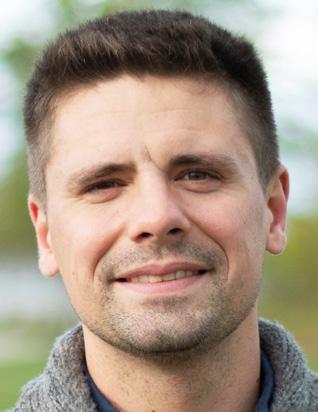

By Craig Cornelsen
THE NHL PLAYOFFS are finally upon us, and for many of us Canadian hockey fans this is the most wonderful time of the year. Teams are now finally prepared to push in all their chips and truly do whatever it takes to get sixteen wins and hoist Lord Stanley’s glorious cup. My family has always been invested in the NHL playoffs—we fill out playoff brackets, pick overtime goal scorers, and stay up past midnight on a school night to see how that West Coast game turns out.
What is it about hockey and especially the playoffs that draws us in? I believe there is something about the drama of ratcheted up intensity and desperation to win. It is the willingness to sacrifice one’s body blocking slapshots, taking body checks and eating punches all for the good of your city’s team. We watch these young men, the premier hockey players in the world, passionately chasing a childhood dream. They are aiming to join the list of Stanley Cup champions that flash across the screen during the Hockey Night in Canada introduction, their name forever immortalized, hand-engraved into the silver trophy. The storyline is enough to get swept up into; as a fan, when you have a horse in the playoff race, your heart enters into the narrative.
This dream of Stanley Cup glory is one that I very much embraced as a kid and even chased into my twenties! Though I never made it to “the show,” the NHL playoffs give me and hockey fans around the world an opportunity to vicariously live out those dreams. Sports in general are so much fun and captivate our imagination, but like someone recently reminded me, “the results are not going to affect my paycheque.” As Christians,

we know that there is so much more to life than playing and following sports, and we know how sports can become an idol, but we can recognize its benefits as well.
So, in light of this playoff season, and for the purposes of this article, the question was posed to me: How do you explain or resolve the tension between church and sports? I will begin my answer with some context of my own upbringing and experience of said tension.
GROWING UP JUST outside of Rosenort, Manitoba, immersing myself in sports was my favorite pastime. My three brothers and I grew up on the generational family acreage and our yard was used to play every sport you can imagine. At school, my classmates and I embraced all the sports including minor hockey and baseball. We all had our parents and grandparents in the stands proudly watching and cheering (and never heckling the refs) as we would take on our cross-prairie rivals of jantsied-Mennonite or French-Catholic descent.
But in our family, hockey was our first love. We were good Canadians that way, embracing Don Cherry’s hockey culture as gleaned from his
popular Rock ’em Sock ’em videos. “Play the game the Canadian way!” he would exclaim with a stoic face and hearty thumbs-up. This meant playing with passion and courage; working hard, staying humble and always standing up for your teammates. Cherry was overtly critical of Russians and Europeans that played “selfish hockey and lacked toughness.” There was a selfless, yet toughas-nails, Canadian hockey culture and identity that we absorbed growing up.
At times this hockey culture and identity clashed with my Mennonite-ness, being brought up in the EMC. I attended church and Sunday school every Sunday, Awana and then youth group during the week and Bible camp in the summer. The good news of Jesus Christ as Lord and Saviour as well as his life-giving teachings were implanted in my heart from a very young age, and I was blessed to have countless godly role models to water and fertilize that soil. Mennonite values such as hard work, humility, serving in the church and, most importantly, a life-long loving allegiance to King Jesus were instilled in me, though these virtues may not have been blasted with Don Cherry’s same intensity.
Thus, growing up as both “hockey player” and EMC Mennonite, I had a difficult time reconciling
these emerging aspects of my identity. I certainly loved Jesus—my family, friends and church; and I also loved hockey—the competition, the challenge, the achievement. But was there room in my heart for both at the same time?
GOD GIFTED ME with some hockey skills and the game opened a lot of doors for me—some good, some bad. When I was 12 years old, our team merged with neighbouring towns in order to have enough players, which meant new teammates and friendships, but also exposure to explicit language and conversation topics in the dressing room. Over time, I was invited to play on travelling spring/summer teams and the pursuit of this hockey dream would take me and my parents all over Western Canada for tournaments, training camps and tryouts.
Over the course of my career that culminated in three years of Junior A hockey, I wrestled with this crisis of identity. My Christian faith was always real and yet the temptations, influence and failure that came along with this good ol’ Canadian game took a toll on my soul. I emerged from my 20-year-old season sick of hockey and disoriented about my future.
The following year I decided to enroll at Briercrest Bible College in Caronport, Sask., and play for their hockey program. It was at that campus where I was able to reconcile my identity crisis and make the connection between faith and sport. I finally embraced the simple truth that while I was a gentle-natured Mennonite EMCer and a hockeyobsessed Canadian, my core identity was first and foremost a child of my heavenly Father. I was able to recognize that God had gifted me with a talent and love for the game and I was blessed with the opportunity to play it to his honour and glory! My worth as a blood-bought, image-bearing son was not affected by wins or losses, and this truth brought back my joy in practicing, training and going to battle on the ice with my brothers. My

Nine-year-old Cornelsen wears the jersey for Prairie Storm, a travelling summer hockey team based out of Southern Manitoba.
hockey journey has shown me that resolving the tension between church and sport begins with an identity rooted in Christ Jesus.
Furthermore, a sports team can offer us a lived metaphor for the church.
IN 1 CORINTHIANS 12, Paul speaks about the one body being made up of many parts as a picture of our common baptism and shared Holy Spirit in the church. He makes it clear that the body needs every part; every part, whether great or small, plays a crucial role in the function, health and success of the body. Hence, the unity of this body is crucial: “If one part suffers, every part suffers with it; if one part is honored, every part rejoices with it. Now you are the body of Christ, and each one of you is a part of it” (vv. 26–27).
Peter, in 1 Peter 2:5, compares the church to a stone wall being built up as a spiritual house, and we are the individual living stones. As stones are bound together by Holy Spirit mortar, there is a strength and security that stands in the face of adversity.
The apostles helpfully use these simple metaphors to describe the makeup of the church, and my hockey-brain immediately connects these ideas to the concept of team
Sports teams are “bodies” or “stone walls” in exactly the way Paul and Peter describe them. Teams are made up of an eclectic group of individual parts with unique gifts and talents that depend on one another to succeed. Team coaches have the job of identifying where each skill set is best suited to contribute to the overall success of the team (i.e. forward or defense or goalie, first line or fourth line, power play or penalty kill). Without a culture of humility, genuine care for one’s teammates and willingness to sacrifice for the cause, the team will not be bound together to achieve its full potential.
I believe that my experience being a part of competitive hockey teams has prepared me to serve in my church in that it has given me crucial insight into how to work as a member of the body and a brick in the wall. Playing hockey has drilled into my character that falling short is inevitable, I cannot succeed on my own, practice and training matter, and I always have an opportunity to build others up. My experience has taught me that being a good church member can be boiled down to being a good teammate
however—in his daughter’s mind—tended to play favorites. In her grade 11 year she found herself warming the bench and at times sitting out entire games. After one of the matches, a fellow parent approached Miller saying, “Isn’t that unbelievable, what the coach is doing? Doesn’t that make you mad?” He replied, “Actually no. We are thankful that Emily has this low-level suffering while she is still on our watch. It is a wonderful opportunity for her to grow in faith. She’ll learn far more about God on the bench than on the playing field.”

SPORT CAN ALSO provide opportunities for faith to grow through adversity. Paul E. Miller, in his book A Praying Life, tells a story of his daughter who was passionate about field hockey. Her high school had a superb, well-coached program that regularly challenged for state titles. The coach,
As the father of a U9 hockey player, I was jolted with conviction upon reading this testimony. So often our goals for ourselves and our children are tied to accomplishments. Sports can provide opportunities to achieve, impress and elevate the name on the back of the jersey. However, the reality according to Hockey Canada is that roughly one in every 4,000 minor hockey players have an NHL career (0.025%). This means that all kids
playing sports will eventually end up benchwarming in one way, shape or form, where the dream of on-ice/-field/-court glory gets dashed. While it’s difficult for kids to go through, in the scope of our lives and eternity, bench-warming is truly low-level suffering, which ought to be viewed as an opportunity to grow in faith in preparation for the temptation and trials that await. As Christian parents, as intoxicating as it is to see our kid succeed, and as much time and money as we have invested into our child’s sports, we do well to aspire for a perspective as mature as Miller’s.
perspective that we are not defined by wins and losses or AAA team track suits. As Christians we must remember that sport is fun, social and good exercise, but most importantly a metaphor for life and the church. I strongly believe that hockey and all sports are gifts from God that have a special way of bringing people together. As his children, we have the opportunity to immerse ourselves in them to his honour and glory.
In this hockey-obsessed EMC pastor’s opinion, when sports are providing opportunities to grow as teammates and in faithfulness through adversity, we will be training up effective and productive leaders for the future church. So may God’s truth and spirit lead us forward as we follow the playoffs and coach our kids (and ourselves) accordingly.
THEREFORE, AS WE tune in to watch our favourite hockey team embark on this grueling march toward Stanley Cup glory, and continue the practice of driving our kids to the rink/field/ gym, I believe it is imperative to maintain the
Craig Cornelsen is the pastor of English ministry at Picture Butte Mennonite Church in Alberta. He is married to Laura and they have two sons and one daughter.


By Earl Unger

IHAVE BEEN involved in church life for nearly 70 years, half of those years as a pastor. I love the church except for one thing: churches and pastors don’t seem to know how to disagree agreeably. Too often when a church and their pastor cannot agree on how well he is doing, separation results. But must it be this way?
Typically, when churches decide that their pastor is not meeting their expectations, they do one of two things, sometimes both.
First, they try to change their pastor. This usually does not work. Perhaps an illustration can help. In my younger days I played a lot of baseball. Inevitably I would hit a batting slump. Coaches,
fellow players, even fans, all offered advice. One said I should move forward in the box, another said I should change my grip on the bat, one even suggested I try batting from the other side of the plate. I tried all their remedies but none of them worked. Why? Because I became completely confused and no longer knew what had worked for me in the past. What actually helped was when a friend who saw my dilemma put his arm around my shoulder and said, “I know you are a good hitter, just keeping trying your best and you’ll find the sweet spot again.”
Pastors are a lot like that. They strike out sometimes, or fail to deliver a timely hit with the bases loaded. Sometimes the home run hitter the church thought they hired is actually a utility player.
But these things being true does not mean the church has a crisis; it’s not necessarily time to try to change the pastor. What pastors need is what helped me when I was in the batting slump. They may need advice from time to time but that is not the same thing as trying to fundamentally change a pastor. What they need most is encouragement: “I’ve got you, pastor; I believe in you; I’m praying for you.” After all, they have spent years developing their skills, becoming competent students of the Word, honing their skills under the guidance of wise mentors, and receiving education at Bible colleges and seminaries.
A church must remember he is the same pastor the church thought so highly of when they hired him. If they just let him, he’ll rediscover the shine they thought he had at the beginning.
Another possibility is that what are perceived as shortcomings on the part of the pastor are merely the results of a congregation making comparisons to the previous pastor, a popular pastor in the community, or someone they have seen on the internet. None of these suggest that trying to change the pastor is called for. Granted, there are times when advice or guidance are necessary, and churches should help their pastor with kind advice.
It must also be recognized that every pastor and church initially go through a honeymoon phase. During this period both church and pastor have difficulty being objective. Both may be operating with blinders neither able nor wanting to see the shortcomings of the other. But this honeymoon phase does not last forever. At some point, these blinders fall away and a greater awareness of each other’s human frailties is gained. Such insight, however, does not mean it is
A church must remember he is the same pastor the church thought so highly of when they hired him.
time to force change. Perhaps, what appears as a slump is a plateau—which may lead to a period of growth in skill, depth and wisdom.
A much healthier way of dealing with the situation is for the church to acknowledge that their pastor may not be perfect but that he does bring strengths and skills to the position that, with encouragement from the church, can lead to an extended period of fruitful ministry. The sign that church and pastor have a strong, healthy relationship, that can produce healthy, lasting results, is when the church provides positive feedback for what their pastor is doing well, sprinkled sparingly with necessary suggestions for improvement, and their pastor welcomes suggestions of areas he could become even more effective. It must be remembered that suggestions for improvement are suggestions, not an attempt to change the pastor.
The second thing churches do when they are not happy with their pastor is they dismiss him. But, in all my years in church life, I cannot recall an instance where firing a pastor was worth the pain and loss involved in doing so. Of course, there are times when a pastor must be terminated for moral failure or heretical teaching, and so forth. But that’s not what we are usually dealing with. Most times a pastor’s sins are much less flagrant like his sermons are too long, his choice of humour isn’t funny, or he doesn’t smile enough.
Of course, there are times beyond moral failure and heresy where changing pastors might be considered. Here are some examples:
■ When a pastor cannot or is not willing to do the job they were hired to do.
■ When a pastor finds it excruciatingly difficult to meet with people and avoids it almost completely.
■ When a pastor genuinely doesn’t have a gift for teaching/ preaching.
■ When a pastor’s health does not permit him to serve acceptably.
When these issues remain after careful mentoring over several years, and hiring a second pastor to address these shortcomings is not possible, it would be legitimate to consider dismissal. Such situations must be dealt with graciously and proper severance should be provided.
Another issue is when the pastor’s theology no longer matches the church’s statement of faith. This is a tricky one because when we look back at the history of our conference, we have shifted in how we understand Scripture on some issues. The key point is that those changes came by consensus within the conference ministerial.
A pastor whose teaching is inconsistent with the church’s faith statement should not necessarily be removed— but he should be willing to receive the guidance of the conference ministerial. If he is unwilling to abide by and teach consistent to such guidance, this would be a case for possible dismissal.
If a pastor is honest, he likely realizes before the congregation does when his effectiveness has waned, and the church would benefit from a new voice. At such times a wise pastor will initiate conversations with trusted people to
Pastors can also be shortsighted when it comes to seeing how they have contributed to the breakdown of the relationship.
confirm or rule out his suspicions. It’s far better for the pastor to discover this on his own than to hear this pointed out by church leadership. In my experience if the pastor and the board are prepared to have a frank, honest, discussion about the situation this can often lead to changes that do not require the pastor being replaced.
Pastors can also be shortsighted when it comes to seeing how they have contributed to the breakdown of the relationship. Sometimes they overlook obvious red flags during the interview process that should have given them pause. The size of the church, the geographical location of the church, the anticipated salary can all cloud their vision. Other times pastors are too thin-skinned and get defensive at the slightest suggestion of improvement. And sometimes their ego gets them in trouble. They go to a church with the full intention of changing it but don’t mention this during the interview process. Just as a church doesn’t have the right to radically change their pastor after he arrives, a pastor does not have the right to radically change the church—that’s the Holy Spirit’s work.
So, what is the solution? Here are five things to consider.
Pastors need to be humble and teachable, not slighted at positive correction.
Pastors need to choose their battles carefully. Sometimes allowing others to fix some problems can extend their tenure considerably.
Pastors with a lone ranger mentality should be avoided. Pastors need to realize that the job of messiah
is already filled. What the church needs are pastors who see their authority as one that is earned and exercised cooperatively with the other leaders of the church.
Churches need wise, mature, courageous leaders who will not cave at the first sign of trouble. Good, effective pastors who are doing their job correctly will at some point offend someone and leaders will receive complaints. Leaders cannot take unsubstantiated complaints seriously whenever someone threatens to leave the church. Sometimes complaints have validity and need to be given consideration, but things like vision or direction of the church are usually developed over considerable time through much discussion and prayer and should be protected from unwarranted attack. And certainly, the pastor should be protected from criticism for simply fulfilling the role given to him or for upholding the vision established by the church.
For the good of both pastors and boards, churches need to move toward more frequent review of the pastor’s work by the board, and away from votes of confidence as a way of assessing the pastor’s effectiveness. Confidence votes are good for creating division in the church and allow for a small minority of the congregation to remove the pastor. Pastoral reviews should be fair, as positive as possible, and kind when suggesting improvements. Boards just as often need to receive the pastor’s evaluation of their performance. They should also be interested to hear their pastor’s assessment of the spiritual condition of the church and what he sees as needing attention.
The keys to disagreeing agreeably are twofold. There has to be mutual respect between a pastor and his leadership team. Without this, the process is lost before it has started. The other is that there must be trust. When disagreements or criticisms come, and all parties trust each other enough to speak honestly and lovingly, striving
to solve a problem together, the church is on the road to success.
This is how a pastor and congregation I knew were able to work joyfully together for over 20 years.
Earl Unger lives in Steinbach, Man., with his wife Caroline. He pastored Stony Brook Fellowship for over 20 years and continues to worship there post-retirement; he says he is enjoying every moment.



impact • By
Gerald Reimer
IN MY TRAVELS around the conference through the years, I have been part of many conversations that coalesce around certain themes. One question in particular is why we administer our own missions program, when we can and do partner with more than 20 other mission agencies.
Every few years the EMC Board of Missions (BOM) takes time to discuss this exact question, evaluating our programs, doing stakeholder analyses, and seeking the Lord’s direction on why we continue to administer, strategize, and supervise our church planting efforts in Bolivia, Mexico, Paraguay and Spain. And to this point, we believe that God is calling the EMC, in obedience to the Great Commission, to do what we are uniquely gifted to do.
So let me give you an example: In January of this year, Anthony Reimer, BOM chair, Ruth Konrad,
EMC outreach assistant, and I went to Columbus, Ohio, to attend the CIM Meetings (Council of International Anabaptist Missions), an association the EMC has been a member of for several decades.
Our theme this year was collaboration. With the help of a facilitator, we spent several days seeking to understand how we can better work together around the world. As each organization shared about their strengths and areas of need, we were surprised to discover that our ministry to Low-German speaking Mennonites is somewhat unique. Other agency representatives asked us many questions about this work, our strategy, and how people responded to our message. What a gift and responsibility God has given us.
We were also thrilled to hear that several of the agencies wanted to work with us in our newest field in Spain,
As each organization shared about their strengths and areas of need, we were surprised to discover that our ministry to Low-German speaking Mennonites is somewhat unique. Other agency representatives asked us many questions about this work.

As EMC Director of Global Outreach, Gerald Reimer supports EMC missionaries all over the world.
particularly drawn to our vision of reaching migrants from north Africa, as well as setting up a training centre to equip a future generation of workers. We were affirmed that while two of these agencies were already working in that region, our vision struck a chord with them. And so, conversations about how we could work together have begun, and we look forward to how God is going to use this collaborative effort to expand his kingdom!
But the BOM analysis also reminds us that we can’t do everything, and that is why we need to partner with others. Which brings me to another theme: how does EMC determine which associate agencies to partner with?
The primary goal of our EMC administrative missions program is to “live as Jesus followers within local communities and invite friends into a life-changing relationship with Jesus and his people” (our new mission statement). To do this we need to partner with others who have expertise in areas we don’t, such as aviation, medical care, education, translation, inner-city ministry, and many other things that are crucial to obeying the Great Commission. We connect with other agencies whose statements of faith, vision, and goals are in line with ours. And in almost every case within the 20-plus agencies, each one has a unique approach to fulfilling the Great Commission.
May the Lord guide us as we collaborate with others who have the same goals, but each bring different tools to get the job done.
By Pat Brandt
FOR DAVE AND me it was our second time to Nicaragua. It was great to see the camp we worked at in 2010 when Lester and Darlene Olfert were there— the same custodian was still taking care of the camp.
But going to another country to do a project is a new experience each time; on this occasion the project was to improve the conference’s national office in Managua. No work had been done on the building for many years, so it needed a complete overhaul. This included a new roof and new sewer lines, and the inside needed to be redesigned to make better use of the space and make it a cheerier place to work.
The work team, serving March 14–29, 2025, was Gerald Reimer—Conference rep, Ernie Koop—team leader, Leroy Siemens, Dave and Pat Brandt, Isaak Peters, Gord Utz, Art Koop, Darrell Guenther and Peter Peters. Peter left after the first week and Justin Brandt and Brad Brandt came the second week.
We first removed all the furniture and office supplies. Some of it went to the camp and some to the Morazan church next door so the women working in the office could keep working during construction.
The men took the A/C off the roof and the T-bar and tiles off the ceiling. After this they worked hard chopping down inside walls and taking out floor tiles. The doors had to stay closed so neighbours wouldn’t complain about
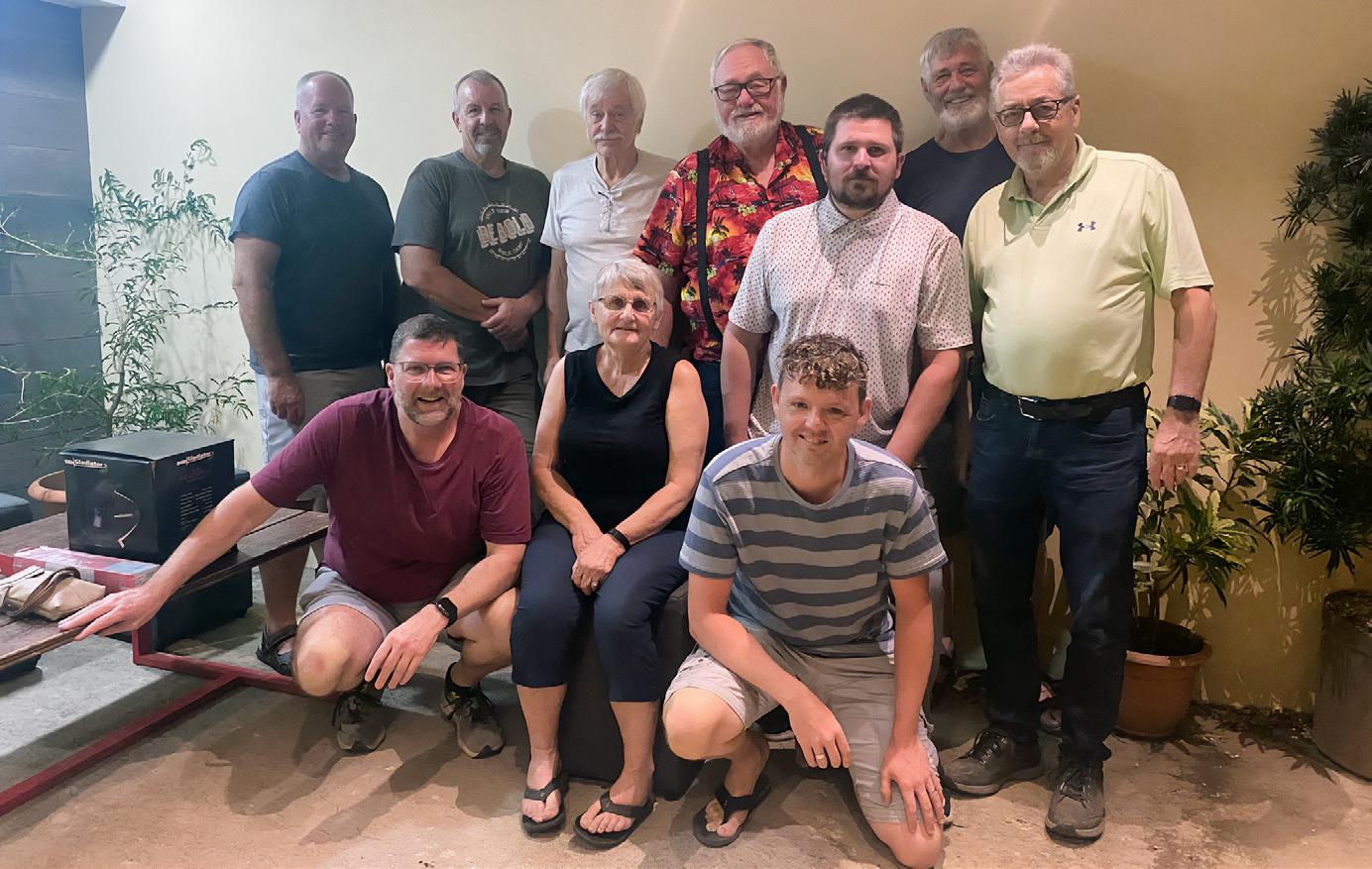
the noise. It was very hot and smelly from sweat, dust and from the old sewage pipes in the building. The temperature outside was always around 35 degrees.
Meanwhile offsite a few of us worked on painting steel rafters which had to get welded. After each day the men were very dirty and tired but, in the evenings, they were cheerful with lots of joking around and visiting, a few card games and an evening of singing and sharing.
On the Saturdays, we did some sightseeing, swam in the ocean and went to a market. We went to two churches one Sunday and another the other Sunday. We also got to meet a Cuban couple that was staying at the guesthouse we were in. We communicated by language phone translation to hear how they left Cuba by faith and trusted in God to plant churches in Mexico. Their visas ran out so they
were in Nicaragua hoping and praying for new visas so they could go back to Mexico and not back to Cuba. It was not looking hopeful, but they were still very positive and asked us to pray for them. The building looked quite destroyed at the end of our stay. When we left, the last inside wall was down, trenching for the sewer lines was being dug, some rebar and some steel beams were in, and some cementing had been done. All the work was done inside—the outside walls were left. Some face lifting will be done on the outside as they progress with the project.
This is only a small picture of what the two weeks were like. We left the building very unfinished, but the local contractor Johel will complete the project while we continue to raise funds. You can learn more at www.emcmissions.ca/projects/ nicaragua-office-renovation.
Working through my identity living in a ‘closed’ country
By an EMC worker Asia
RETURNING HOME AFTER spending time in my host country often brings unexpected challenges. One of the most surprising struggles is the question of identity—how I see myself, how others see me, and how I introduce myself in different contexts. When I’m overseas, I expect to navigate cultural differences. But at home, I don’t expect to feel foreign—yet I do. The identity I carry daily in my host country doesn’t translate the same way at home; this makes the transition more disorienting than I anticipate.
Navigating multiple identities
As I reflected on my identity, I made a list. Among many others, I am a child of God, a daughter, sister, aunt, and niece. Professionally, I am a nurse, childbirth educator, businesswoman, “global worker,” and teammate. Some aspects of my identity, like being a child of God and part of my family, will always remain. Others, like my profession and work roles, will likely change over time.
The way we introduce ourselves often reveals part of our identity, but the content of that introduction shifts depending on the situation. If I find myself in a setting where I can offer health advice, I may introduce myself as a nurse. On another occasion, I might mention my family background, assuming this holds significance for my new acquaintance. Often I describe myself as a businesswoman who loves
Jesus. Each of these descriptions is true, yet each emphasizes a different aspect of my identity.
The complexity of identity
Living with multiple identities can be complicated. In my host country, I present myself as I am seen in the community—as running a business to support local women during pregnancy, childbirth, and postpartum. I’m open about my faith, but it’s understood as part of my personal life rather
I find that I am most comfortable using the identity of a businesswoman who loves Jesus, which is what I’ve become accustomed to in my host country.
than my profession. I am a businesswoman who happens to follow Jesus. And what do followers of Jesus do? They share and tell others about him whenever and wherever they might be. The local church and our friends know we share the good news, but it’s woven into my identity as a businesswoman, rather than the primary focus.
At home in Canada, my identity shifts because my supporters view my work through a different lens. Since traditionally businesswomen have not been sent by churches, and supporters don’t witness the nitty-gritty details of what I do on a day-to-day basis, they may be more likely to place the emphasis on the gospel work I’m doing and was sent to do. I am deeply grateful for their love and support, but I sometimes wrestle with feeling caught between
how I present myself and how they perceive me.
I find that I am most comfortable using the identity of a businesswoman who loves Jesus, which is what I’ve become accustomed to in my host country. This is partly because it has become a daily habit, but also for security reasons. Any introduction that emphasizes my role in sharing the gospel could draw unwanted attention and potentially lead to my removal from the country. (Though unlike in some other closed countries—I can be open about being a follower of Jesus to most anyone.)
I have grown so used to this way of introducing myself that I prefer to use it even when I return home. Sticking to one identity is less mentally taxing because it removes the pressure of
deciding how to introduce myself in each new interaction.
In the midst of these identity tensions, I continually remind myself to trust God. His promises bring comfort and confidence in my calling. To paraphrase Psalm 27:1, the Lord is my light and my salvation—why should I fear any situation that may arise from the realities of my work? Hebrews 13:5 reassures me that God will never leave me or
forsake me, and Joshua 1:9 reminds me that he is with me wherever I go, even when identity struggles feel overwhelming. These truths anchor me when I feel uncertain about where I belong or how I am perceived.
For those who support global workers, especially those serving in security-sensitive countries, open conversations about the challenges they face can go a long way in showing understanding and respect for their unique struggles. Also recognizing that business and faith can go hand-in-hand
‘How much does Jesus cost?’
By Cole Murdock SBC MissionX, Spain 2025
WHAT DOES IT look like to sacrifice for the glory of Jesus? For some of the new friends that our MissionX3 team met in Spain, it meant they walked away from Islam and decided to follow Jesus. It meant more than just leaving a religion. Their families became more distant and, in some cases, it led to surrendering earthly safety. Even though this cost seemed significant and difficult, declaring their allegiance to Jesus was more important to them—it was clear that God had called them.
I know that our team was encouraged and challenged by the stories of these new friends. I cannot speak for everyone who was there, but these stories of faith led me to some questions about my own convictions. I often wondered, “What does it cost to follow Jesus in our context at home in Canada?”
One of the challenges of the Christian life is that it is hard to balance life
in the world (in the context you are in) but to not be of the world (to live a life different than those around you). Throughout our whole time in Spain, I wondered how I, a normal person, could live a life that reflects Christ and gives glory to our God. I do not have a complete answer as to what this looks like. But I do know that I am incredibly grateful for the ways this was modelled for us in Spain by all the amazing people that we met.
I encourage you to pray for new Jesus followers who are living in a Muslim context. It is not easy to leave
helps believers to see the full picture of the work being done.
Ultimately, no matter how my identity shifts in different settings, my true identity is found in Christ. I am God’s handiwork, his child, created to worship him and to do the good works he has prepared for me. When I rest in that truth, I can navigate the complexities of my earthly roles with confidence and peace.
This worker is unidentified due to security concerns.
behind this religion because it is far more than just a set of beliefs—it is a lifestyle, a culture. And I would like you to pray that God would shape your faith not just into a simple set of beliefs that are followed, but a lifestyle that can be truly lived through the guidance of the Holy Spirit, with a growing relationship with Jesus Christ, bringing honour to our Father in heaven.
Cole Murdock is a third year student who was part of Steinbach Bible College’s Mission Exposure team that recently spent three weeks in southern Spain.

By Christy and Jake TeachBeyond
OUR BEYOND BORDERS colleague, who pastored among fellow civil war refugees in Uganda, reflected on the dehumanizing treatment many displaced persons experience, often being labeled as threats, burdens or cultural invaders. “The movement of refugees,” he said “should be seen not just as a crisis, but as part of God’s divine plan. From a biblical perspective, refugees are kingdom builders, fulfilling a mission even if it’s not immediately visible.”
The apostle Paul reminds us that, in light of the new life we undeservingly received, “All this is from God, who reconciled us to himself through Christ and gave us the ministry of reconciliation” (2 Corinthians 5:18). Reconciliation is at the heart of God’s kingdom, and it is through such love that we reflect Christ’s teachings. Those on the margin, the displaced and those with deep wounds suffer from stigma and stereotype because
of unspeakable suffering which only unconditional Christ-like love can heal.
A young Afghan woman was 14 when she received a marriage proposal from a militant group member. Struggling with anxiety, she sought guidance from a local mullah. To minimize pressure to arrange the marriage, her father found a good man for her to marry; however, the pressure and threats continued. The couple escaped to a neighbouring country. The first of two daughters was born there, before the family found help to cross the Mediterranean to the island of Lesvos, Greece.
The refugee camp was overcrowded, and they lived in a tent with four other families. One night, fleeing violence inside the camp, they met a group of volunteers who shared the gospel with them. Through this encounter, they began to follow Christ and were baptized.
After relocating to Athens, this Afghan family joined a discipleship team church planting among the transient refugee population. Miraculously, they received asylum in Canada two

The Karatepe (Greece) refugee camp on September 9, 2020.
years ago. They are currently preparing to return to Greece to rejoin the discipleship team.
David (a doctor and Ethiopian Jew) went to Niger as a refugee after being held hostage by a rebel group. He began attending Bible studies at the Beyond Borders library near the camp which offered educational and community building opportunities for refugees fleeing crises in surrounding nations. Reading the New Testament for the first time, David was deeply convicted and received Christ. When a coup caused the team leaders to evacuate, he took over leadership of the centre. Besides Bible and English classes, this includes caring for unaccompanied minors, helping with food shortages and advising people from fleeing into even less secure environments.
A young man in Addis Ababa left his teaching job to commit himself to the education of internally displaced children compelled to beg on the street. Through his tutoring and wholistic care, the children build their capacity and bridge the gap to enter school.
These are a few glimpses into the work Beyond Borders supports in refugee camps and refugee-populated cities around the world. We are witness to the phenomenon of God’s people on the move and partner with refugee believers and leaders who see purpose in where God has led them.
Christy and Jake are associate missionaries with EMC, serving with TeachBeyond. Christy is part of Beyond Borders (ministry of TeachBeyond). If you are interested in learning more, please reach out to cdyck@teachbeyond.org
Kola EMC Kola, Manitoba
November: Women’s conference
Some 200 women gathered in our new fellowship hall for food, singing and worship. The speakers shared how God had led them in and through difficult seasons of life.
December: Christmas
It was great to have our children and youth enthusiastically portray Jesus’ birth in song and drama.
January: 2025
A new year with new beginnings and commitments. We had a weekend of Bible studies in the book of Ecclesiastes with Gord Penner from Steinbach Bible College speaking. On Saturday he shared with the men at the men’s breakfast, and his wife Laura did a devotional at the ladies’ tea in the afternoon. Her topic was Mary and Martha, their differences, and how on any given day we could be either or both. Good thoughts to ponder.
February: Parent-child dedication
Pastor Ernest’s message was on “Celebrating the Family” (Deuteronomy 6:1–9; Genesis 1:28; Psalm 127:1–5) His points were:
1. Perspective – God’s plan
2. Passionately – Love God as Lord
3. Diligently – teach it in word and deed
4. Conclusion – Keep your eyes on the Lord and his plan. It is the Lord who builds a successful home.
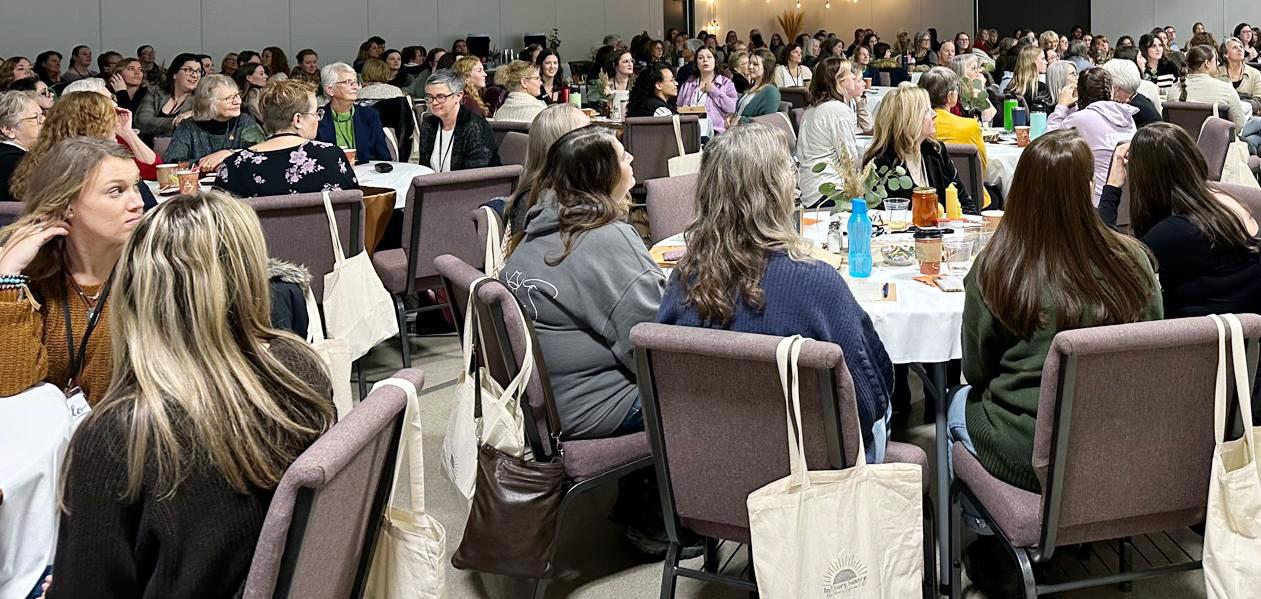
Four couples dedicated their children: Ben and Kate Bajus with son Oliver; Keith and Allison Hyatt with son Jake; Evan and Chealsey Beutler with son Scout; Alex and Emily Bajus with son Wade.
Parent comments:
“Parenting can be a blessing but it is also stressful. Getting your child dedicated in front of the church body is a realization that fellow believers are supporting you along the way.”
“Baby dedication does not guarantee the salvation of your child. The true responsibility falls on us as parents to train our children in the way they should go. Baby dedication is a public declaration of us accepting that responsibility and asking our church to help us in doing so. We are publicly stating our intentions and goals when raising our children.”
– Mary Braun
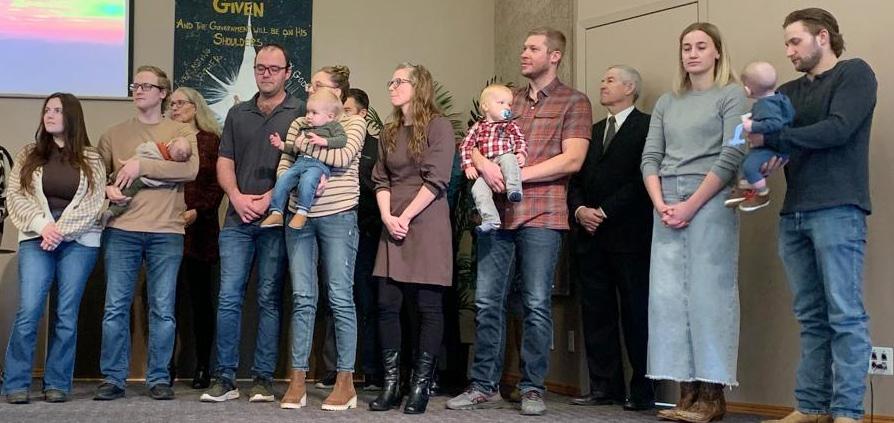
Picture Butte Mennonite Church Picture Butte, Alberta
“MAYBE WE CAN get 10–12 people!”
Those were the thoughts of Jonathan Neufeld and Pete Hiebert when they first began planning a mission trip for the young adults group at Picture Butte Mennonite Church (PBMC). An opportunity to volunteer at El Buen Samaritano (a seniors home) in Vicente Geurrero Baja California, Mexico, was presented to Jonathan in early 2024. Jonathan then presented this opportunity to the small group of young adults and the idea was received with much interest. At the time of the signup deadline, 29 eager individuals had signed up!
November 21, 2024, the young adults group hosted a fundraiser to
raise money to pay for the projects that needed to be completed at the seniors home. A generous number of items were donated to be raffled off and carnitas were prepared and sold for supper. The day of the fundraiser, they were surprised with a terrible snowstorm, and it was hard not to be discouraged as they no longer expected many people to show up. To everyone’s surprise, it was a full house, and the supper was sold out before the evening was over! After the donations had been counted, the team was overwhelmed by the success of the fundraiser—the goal was (marginally) surpassed.
The team flew out on February 5, 2025, escaping a cold snap in southern Alberta. Welcome Home Outreach Ministries, a preschool and daycare that hosts short-term missions teams, provided accommodations. A list of projects was waiting for the group at El Buen Samaritano. It included building a new clothesline, building a pergola to provide shade, cleaning out and building shelves in the storage room for donations, and painting all of the seniors’ rooms.

In early 2025, Picture Butte young adults travelled to Mexico to assist at a seniors home.
The team wasted no time and got straight to work. With 29 people, there were a variety of skills and professions that provided a diverse and efficient team to complete these projects. The team was divided into groups based on their work experience—among them were welders, carpenters, arborists, concrete workers, mechanics and many more. The facilitator of these projects said he had to jump out of the way so he wouldn’t get trampled—the enthusiasm and initiative of the team astonished him!
The elderly folks watched as the team worked. Each senior owned next to nothing and with nothing to do but sit around all day everyday, they enjoyed the change of pace in their environment. They loved having so many young folks around to talk to. Although only two out of the 29 people on the trip were fluent in Spanish, and the language barrier made it difficult to understand each other, the seniors still chatted up a storm.
The majority of the time was spent working on the projects, but throughout the week small groups took turns fellowshipping and playing games with the elderly folks. The team also sang for them which the seniors absolutely loved.
This experience touched the hearts of everyone who went on this trip—to step out of the comfort of their own lives and step into the world of these seniors. It put into perspective how many things we take for granted in Canada, and how comfortably we live.
– Peter Neustaeter
Ministerial: April 25, 2025
Cameron McKenzie opened the meeting with the thought that anything we repeat over and over again—like the Easter message—risks losing impact. But, he said, resurrection isn’t a single event—it is the heartbeat of the gospel, and whatever we find ourselves doing, we’re cultivators of resurrection communities.
The Board of Leadership and Outreach requested the input of the Ministerial on two questions.
Question One: Is it essential that the EMC moderator be an ordained minister for a minimum of three years, as stated in the EMC Constitution? Responses affirmed the importance of the role, but also noted there are godly, wise people who would do an excellent job in a moderator role but do not feel called into lifelong pastoral ministry. Discussion followed about the reason for this requirement and some of the potential implications of changing it.
Question Two: Should it be a requirement that all members of the Board of Leadership and Outreach (BLO) be credentialed EMC ministers? Currently the constitution requires that four of its seven members be credentialed. Responses recognized the value of diversity that non-credentialed members bring but also thought it strange that the conference ministerial would be led by non-ministerial members. The current format is a delicate balance of wanting to preserve inclusion while also wanting to ensure that board members are in line with the
general direction and theology of the EMC with a recognized calling/gifting. Both questions will be returned to the BLO for further consideration.
The meeting ended with small group prayer time, and an overview of the Abundant Springs youth conference weekend, followed by group prayer for that event.
Newly hired Director of Canadian Outreach Carl Heppner opened the meeting by recounting the Easter story and asking what it means to have Jesus in the room, showing us his hands and feet. Sometimes, he said, we get caught up in big picture questions while Jesus is saying, “I’m here with you; can I have some fish?”
General Board: work with partnership agreements and constitutional changes are ongoing.
Board of Trustees held a treasurer’s day, and it went well. EMC is supporting SBC in their building project. The audit has been completed.
Board of Missions is reviewing a decision made a few years ago to reduce EMC missionary support from 100 to 60 percent. They invite feedback from the conference.
Board of Leadership and Outreach: current focus areas are developing more useful Anabaptist/theological guidelines, trauma-informed pastoral care and ability for pastors and congregations to have meaningful conversations across different views.

Director of Canadian Outreach Carl Heppner presents a devotional from the EMC national office boardroom during the April 26, 2025, Conference Council meeting, which took place over Zoom.
Canadian Church Planting Task Force will be working more closely with the BLO to be more aware of the needs in churches. Cross-cultural opportunities are growing in Canada.
Board of Church Ministries has approved an Artificial Intelligence policy. Digital versions of The Messenger have caught up with the print, and staff will add pastors to The Messenger ’s email subscriber list going forward.
National Youth Committee is focused on Abundant Springs, which is just around the corner. After that, they will consider how to support further Bible education among recent grads.
Every board had poll questions for the delegates. Full minutes with poll responses can be found on the EMC website at www.emconference.ca/ conference-council.
– Erica Fehr
Without Dividing the Church, was held March 14-15 at Steinbach Bible College (SBC) and featured Rick Langer, professor at Biola University. Langer began by asking, “Is winsome conviction worth pursuing and why is it so crucial? Why was it important for 120 church leaders from the EMC, CMC, EMMC, MB and other conferences to attend this conference?”
In the first session on Friday night, Langer pointed out there is a growing rift in society that has intensified in the last few years. This has grown into something he called “affective polarization” where individuals not only do not agree with each other but also hold disdain for one another.
In answer to the question of why it is important for pastors and church leadership to attend this conference, Langer said, “I really do think that in a lot of my life history, the animosity intention (affective polarization) that I’ve seen has been between the church and the world; and in around six or eight years’ time, I feel like it has moved indoors.”
Rick Langer, conference speaker, says attendees need to listen to find out what is in the other person’s “black box.”

When Christians disagree in theology, “they are saying that the other party got Jesus wrong.”
Langer pointed out that in society, differences such as political disagreements are characterized by viewing the other party as either malicious or misinformed. This predicament gets complicated in disagreements in church because when Christians disagree in theology, “they are saying that the other party got Jesus wrong.” This serious undertone carries the same inflection as an accusation of being a false prophet.
So then, what is the step forward from this dismal condition? How can a group of 120 church leaders make a difference? In an interview, Dave Reimer,
president of SBC, spoke of the need for the church to make efforts to stand united. “Nobody knows who is actually speaking for the church because we are so divided.” Langer confessed that even though he knew this conference would not solve all the problems in the church, it might make things a little better. He said in an interview, “I am a huge fan of local efforts on things like this ... You cannot change your country, but you might change your church. You might change your workplace” and other places where you have influence.
In the second session, Langer presented principles of disunity and
principles of unity as seen through the eyes of Puritan Jeremiah Burroughs. The principles of unity feature consideration of others, being gracious, and listening to what others have to say. We need to find out what is in the other person’s “black box,” which Langer described as the hidden things within every individual that influence the convictions that they hold. These include background stories, upbringing, and many other influencing factors. Langer encouraged us to listen to others to find out what is in the other person’s “black box” and to share our own reasons and the path that led to our convictions. He likened this to what many teachers tell their students in math class, “show your work.”
Langer allowed time for follow-up questions in each session. In one of these, the point was made that church leadership needs to discern whether certain issues are important enough to expect complete agreement. For the highest level, “absolute conviction,” it is vital to have unity. It becomes less important to agree as an issue goes into “personal conviction” and from there to “matters of taste.”

Even though disagreements are inevitable, our love for one another in disagreement is a powerful witness to Jesus through the church.
One might think that a way to remove disagreements in conviction is to be silent and not bother discussing opposing convictions. Langer compared this idea to half-baked banana bread. When we bring our convictions into the world without discussing and testing them in conversation, they are an “unbaked, gooey mess.” But when we engage in dialogue with others who hold contrary convictions, our convictions are “put back into the oven” and are tested and strengthened. We can also be the place for others to “bake” their convictions, but this must be done in love.
This love which we are called to live out in the church is key to having Winsome Convictions: Disagreeing Without Dividing the Church. Even though disagreements are inevitable, our love for one another in

disagreement is a powerful witness to Jesus through the church. Langer urged us to not limit our relationships with our fellow brothers and sisters in the church to agape love, which can be just a choice with a huff and side eye, and instead pursue fondness for one another.
In closing, let us recognize that we have different convictions. Let us strive to achieve genuine honest disagreement. This means conversing with people with whom we disagree until we can accurately describe the other’s point of view. We conclude here with the conclusion of the conference: “In the midst of the all the polarization, let me plead with you, first and foremost, let us cultivate fondness.”
– Jonathan Redekopp, first-year SBC student

WINNIPEG, MAN.—A NEW weekly radio program and podcast produced by the Mennonite Heritage Archives (MHA) in Winnipeg is bringing history to life through storytelling.
A team of four people creates each 15-minute episode using information gleaned from archival diaries, documents, and photographs, and interviews.
Archivist and team leader Conrad Stoesz said, “The program offers an eclectic mix of stories, music, and interviews that are worth sharing and remembering. I believe there’s something for everyone in the stories held at the MHA.”
Stoesz had already been creating five-minute micro-documentaries called Still Speaking that were broadcast on Golden West radio stations in southern Manitoba. In response to positive listener feedback, Golden West offered to support a longer 15-minute format.
People from diverse backgrounds find the MHA indispensable in their work, said Stoesz. They routinely uncover characters and stories in MHA collections that find their way to a wider audience.
“Lawyers, novelists, policy makers, journalists, and historians all use the archives. When these stories are shared, we all benefit from what is preserved here,” said Stoesz.
“When these stories are shared, we all benefit,” said Stoesz.
Show host, researcher and writer Dan Dyck voices the program. Dyck has a long-standing interest in the stories that are buried in history. “The idea for Tales was born out of conversations with Conrad starting a number of years ago,” said Dyck.
Dyck has previously produced and voiced audio content. “I love to share the riches in stories. Along the way, I get to learn about ordinary people from the past, how they managed the challenges of life in their time, what motivated them, and so on. Once in a while we discover stories of ordinary people doing extraordinary things, or unusual events in unexpected places. There’s a lot we can learn from the past.”
Caley Dyck also researches and writes for the program. The recent History of Art graduate is drawn to the stories that connect with her own Mennonite background. “I love doing historical research, especially when there’s a personal connection. It’s exciting to explore the stories in the MHA, and to share those stories.”
Graeme Unrau handles the web and audio distribution side of the project. He manages the Tales web page, posts photos there for each episode, and handles distribution of the program to Spotify and Apple Music platforms.
“I enjoy seeing the process of taking an idea and bringing all the parts together. There is so much work that goes into a project like this one, especially if you want it done well. Collaborating with Caley, Dan, and
Conrad on this has been a great learning experience,” said Unrau.
Twenty-five episodes are already available for listeners covering topics that range from Flower Annie, who sold crepe paper flowers on the streets of Winkler, to the history of Der Friedensfurst (The Prince of Peace) a popular Christmas song with often misplaced origins, to the community of Warman, Sask., who said no to a uranium refinery, to local celebrity, Aunt Olly and her Children’s Party program.
Tales from the Mennonite Heritage Archives can be heard on AM radio 950, 1220, and 1250 at 9:15 a.m. Sunday mornings. The program can also be found on the MHA website www. mharchives.ca, Spotify and Apple podcasts. A new episode is released each week.

IN THIS SHORT but deeply moving book, Jennifer Siran takes the reader through the multi-faceted aspects of having a child born with congenital heart defects. (Siran attends the Kleefeld EMC where she serves as secretary and kids ministry coordinator.)
Siran is encouraging and practical as she visits many topics that are affected by this unplanned medical journey.
Marriage is one such topic, particularly how the unknowns can cause a strain on marriages. Siran discusses the need to have grace for one another and explores how the path of processing, trauma and grief can be so different for two people.
Siran also approaches how to navigate relationships with healthcare personnel and how beneficial it can be to build good relationships with your team. She goes on to touch on answering questions people have and updating social media.
All of these are approached in such a personal way—the story of their son is beautifully woven into the fabric of

When
her practical advice, encouragement and vulnerability.
Siran has truly created a gift for those walking this path alongside her. I particularly think that the optional
As a parent who has never experienced this journey, I found this book did a beautiful job of giving a glimpse into the heart-wrenching twists and turns of a parent walking this path of unknowns. Often, we can take life for granted and I found Siran’s When Your World Stops to be a well-needed reminder of the beauty of life.
guided meditation she added to the end of each themed chapter is a powerful resource. Each prayer is worded with raw openness and takes the reader to a place of crying out to Jesus regardless of the circumstances.
Siran also includes a well-thoughtout guide at the end of the book on how to meditate for the beginner. I also loved the little parable Siran places in one chapter. It truly moved me and simultaneously revealed the giftedness of this author. Rochelle Reimer makes an appearance towards the end of the book and shares a small glimpse into the journey of a mother after losing a son.
As a parent who has never experienced this journey, I found this book did a beautiful job of giving a glimpse into the heart-wrenching twists and turns of a parent walking this path of unknowns. Often, we can take life for granted and I found Siran’s When Your World Stops to be a well-needed reminder of the beauty of life.
I strongly recommend this read to any parent regardless of whether this is a journey you can relate to or not. Meanwhile, parents who can relate will find this book to be a life-giving guide. Overall, this book is well-written, personal, and hope-filled. I would gift this book to anyone in my life who was, or is, or will be walking this journey. It felt like a companion’s guide and a call of “you are not alone.” I truly believe this book could be a life-giving tool for someone walking through a dark season of life.
It would also benefit pastors to gain understanding of the struggles families such as Siran’s work through.
Please send all position ads (150 words or less), including pastoral search ads, to messenger@emconference.ca. Ads may be edited. Please advise us when it is no longer needed.
Often there are more churches looking for staff than are identified on this page. For information on additional openings, contact Conference Pastor Andy Woodworth (awoodworth@emconference.ca or phone 204-326-6401).
Senior Pastor: Community Bible Fellowship (Swan River, Man.) Community Bible Fellowship (CBF) in Swan River, Man., is seeking a full-time senior pastor. Swan River is a community with a population of about 4,000 with smaller towns, communities, and reserves within the valley totalling around 8,000 people. The church’s ministries include: worship, discipleship, hospitality, missions, youth, and children’s discipleship.
We are seeking a Spirit-filled pastor with a servant heart to encourage and lead by example in all areas of ministry. Since, as a church, we value the contributions of each member, we want a leader who is able to train, equip and empower our members in ministry, and will preach biblical truth to develop spiritual formation and growth. A successful candidate have a minimum of two to three years of biblical studies (bachelor’s degree preferred) and would be willing to become credentialed with the Evangelical Mennonite Conference.
Please send your resume to: cbfchurchswanriver@gmail.com
Pastor: Morris (Man.) Fellowship Chapel Morris Fellowship Chapel is a Christfollowing, Bible-believing, family-friendly church of around 130 people in the small rural town of Morris, Manitoba. People of all ages are a part of Morris Fellowship, including children, young adults, adults and seniors. We are looking for a pastor to help with preaching, teaching, and building community in our church. This would include preaching on Sundays, teaching midweek Bible studies, personal visits and church community events. Contact Cliff Reimer, Pastoral Search Committee Chairman: cliff0955@gmail.com.
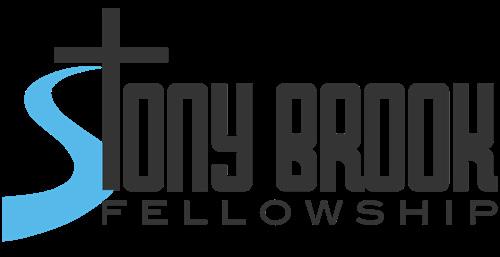
Community Life Pastor: Stony Brook Fellowship, Steinbach, Man. Stony Brook Fellowship, a church in Steinbach, Manitoba, is seeking a half-time associate pastor. The community life pastor is to help provide pastoral care to the congregation and oversee the development of relationships within our spiritual family. The ideal candidate will have a minimum of a Bachelor of Arts degree, at least five years of ministry-related experience and strong interpersonal skills. Stony Brook Fellowship is a multigenerational church of about 170 attendees that encourages the under-churched and over-churched to live as devoted followers of Jesus.
For information visit stonybrookfellowship.com/pastor-search. Interested applicants should submit their resume to psc@stonybrookfellowship.com.

Pastor of Youth and Young Adult Ministries: Niverville (Man.) Community Fellowship
Niverville Community Fellowship, part of the Evangelical Mennonite Mission Conference, is seeking a pastor of youth and young adult ministries to join our ministry team as we seek to continue to action our mission of Making Disciples of Jesus as we Worship, Grow, and Serve in Love. The pastor of youth and young adult ministries will be a devoted follower of Jesus Christ with a commitment to Anabaptist faith and theology as expressed in the EMMC statement of faith and a growing relationship with Jesus Christ. The role of the pastor of youth and young ministries is to introduce and disciple young people into a life lived for Christ by our example, teaching, and relationships founded in love. For more information or to apply please contact hr@nivcf.ca. Deadline for applications is June 30, 2025.

Fort Garry Mennonite Brethren Church seeks a Spirit-filled lead pastor to provide biblical, theological, and spiritual leadership to our congregation. The lead pastor will champion the mission and vision of our church, be a servant leader, guiding staff and volunteers in implementing ministries and fostering a healthy, life-giving culture. Key responsibilities: provide spiritual leadership through preaching, teaching, and pastoral care; lead and mentor staff team; collaborate with church council; foster community outreach and missional
engagement. Qualifications: Bible college or undergraduate degree in ministry (minimum), minimum five-plus years of pastoral leadership experience, credentialed (or willing to become credentialed) with the Canadian Conference of MB Churches, demonstrated leadership, communication, and organizational skills, living a Christ-centered life. To apply, send your résumé to pastoralsearch@fgmb.ca . For more information, go to https://fgmb.ca/
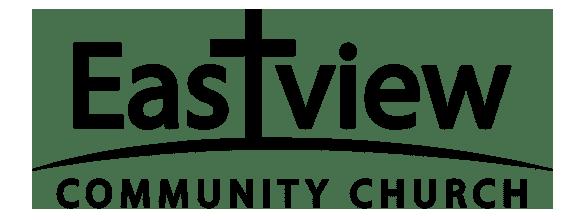
Lead Pastor: Eastview Community Church
Eastview Community Church, a suburban church located just northeast of Winnipeg in the rural municipality of East St. Paul, Man., is seeking a lead pastor to guide our community in deepening discipleship. The lead pastor will lead a multi-generational, community-oriented congregation with a weekly attendance of 475-plus and a team of 10 staff. The lead pastor is responsible for developing and leading the vision that will help Eastview live into our mission and
LEAD PASTOR PAUL EPP and his wife Laurel St. Vital EMC
will oversee the ministries and strategies that will guide Eastview to accomplishing its mission and vision.
Qualified candidates will have a graduate degree in a related field and at least ten years of ministry experience. For a full job description go to https://eastview.org/ pastoral-search/. Candidates are requested to submit their resume, along with a cover letter, a two- to four-minute personal introductory video file, and a one-page overview of their ministry/leadership philosophy to: pastoralsearch@eastview.org.

Lead Pastor: Gospel Fellowship Church, (Steinbach, Man.)
Gospel Fellowship Church is seeking a fulltime lead pastor. We are a congregation with an average attendance of 75; our church is a part of the Evangelical Mennonite Mission Conference (EMMC). GFC is a faith community in a broken world, sharing the hope of freedom in Christ. We are searching for an individual who passionately loves God and loves people, one who is able to provide vision and direction for our church, and willing to compassionately lead our congregation with sound biblical teaching.
For a full position description, please visit our website (www.gospelfellowshipchurch.ca) or contact us at applications@ gopselfellowshipchurch.ca

Executive Director: Mennonite Disaster Service (MDS) Canada
Are you a highly motivated leader with a passion for faith in action? As executive director, you will provide transformational leadership and implement the board’s strategic direction. You will live out organizational
values—faith in action, working together and caring relationships—in how you work and lead. As we anticipate continued growth, you will work at developing strategies and systems with flexibility to support our growth and manage the ebb and flow of disaster response in Canada.
For more information and to apply, visit mds.org/employment. A first review of applications will begin June 30, 2025.

Church and Donor Relations Coordinator: Africa Inter-Mennonite Mission
Africa Inter-Mennonite Mission (AIMM) is seeking a church and donor relations coordinator to deepen relationships with churches and donors, grow the community of AIMM supporters, communicate what God is doing among AIMM African members, and strengthen relationships between North American and African Anabaptists. For more information, please visit https:// www.aimmint.org/employment-opportunities.html.

Principal: Morweena Christian School (Arborg, Man.)
Morweena Christian School is a K–12 school with approximately 200 students located near Arborg in the Interlake region of Manitoba. We are searching for a candidate to apply for the principal position. Job opening is for the 2025–26 school year. A Bachelor of Education is required as well as a minimum of five years of teaching experience. Preference is given for a master’s level of education. Please forward inquiries and resumes to James Plett, board chair, at boardchair@morweenaschool.ca
His light to my path • By
Karla Hein
HAVE YOU EVER heard of Horatius Bonar? He was a pastor in the early 1800s who wrote 600 hymns and poems. I tried to find a relatable comparison in my life. I figure that in 13 years of marriage, I’ve probably written close to 600 grocery lists. Many of those end up crushed into tiny, wrinkled fragments in the bottom of my purse. And absolutely none are being sung en masse on Sunday mornings— though my family is grateful for our well-stocked fridge and freezer!
amazing grace to the depth of his soul, transforming the old, soiled creature to a new, clean creation. He was a joyous, well-loved pastor who cared deeply for his congregation.
William Cowper was quite the opposite of his pastor. Dealing with terrible loss and abuse from childhood, Cowper struggled deeply with depression, despair, and suicidal thoughts. John Newton was a faithful and caring presence, speaking truth and comfort to his dear friend. Together,
Dealing with terrible loss and abuse from childhood, Cowper struggled deeply with depression, despair, and suicidal thoughts. John Newton was a faithful and caring presence.
Horatius reminded me of another hymn writer, William Cowper. Cowper’s pastor was none other than John Newton. My assumption was that Newton’s post-conversion demeanour would be that of a sombre, old man. His glum expression paying penance for his horrendous sins. Foolish me to forget that he who is forgiven much, loves much! Pastor Newton experienced

they compiled a hymnal called Olney Hymns, which contains one of my favorite hymns, “God Moves in a Mysterious Way.” It’s a masterful work of poetic theology by William Cowper.
The lines are penned from a heart that had encountered the mingling of grief and grace. I suspect hymns and their writers capture me for the same reason that the psalmist wrote
Karla Hein (Westpointe, Grande Prairie) is the wife of one and mother of two.
Psalm 95. It begins, “Come, let us sing for joy to the L ord; let us shout aloud to the Rock of our salvation.” Then the psalmist provides some reasons for that exuberant praise. God is great (v. 3). God is creator; he is sustainer (vv. 4–5); our maker and keeper (vv. 6–7).
Then comes the core reason that I appreciate Sunday morning worship and my continuous stream of Spotify worship playlists: “…Today, if only you would hear his voice, do not harden your hearts…” (vv. 7–8). The writer of Hebrews quotes this psalm as a reminder, “See to it, brothers and sisters, that none of you has a sinful, unbelieving heart that turns away from the living God. But encourage one another daily, as long as it is called ‘Today,’ so that none of you may be hardened by sin’s deceitfulness” (3:12–13).
Why do I appreciate William Cowper’s song? Because I need to remember to “judge not the Lord by feeble sense but trust him for his grace.” I daily need to remind myself that “in his hand are the depths of the earth, and the mountain peaks belong to him” (Psalm 95:4). I constantly need to be renewing my mind, repeating the Lord’s goodness and his promises, because the cares of this world can easily distract my affections. Psalm 96:2, “Sing to the L ord, praise his name; proclaim his salvation day after day.” Isn’t that a wonderful adventure? Instead of looking for what we will eat, wear, and drink let’s look throughout the day for his blessings and praise him for his salvation.
Further in and higher up • By
Layton Friesen
HAVE YOU EVER heard a so-called “truth” once too often?
Here’s one I heard recently: “being on mission is not just about going overseas as a missionary; it’s also staying home to serve God wherever you are.” Who could argue? But suddenly I had heard this one too many times. Instead of a timely truth I now saw a donkey my generation loved to flog. I’ve taken my turn with the stick too. Because we thought our churches were overemphasizing foreign mission to the detriment of local discipleship, we kept saying this, for decades.
But surely that donkey is now soundly deceased? Show me the churches, colleges and denominations that are still sending out so many global missionaries that they need to be assured it’s also fine to stay home. Most Bible colleges whose founding purpose in the mid-20th century was to train missionaries have now shuttered their missions programs because no one is signing up. EMC missions now has exactly 12 people under EMC administration, from a high of 58 in 1980.
“Staying home is service to God too” was preached just when the affluence of consumerist North America was gripping our imaginations. People like me were relieved to hear we could serve the kingdom and keep the winter vacations, double car garage, Christian private school, and ski boat. It was a “truth” to the wrong people at the wrong time.
Here’s another “truth” that needs retiring: “Worship is not just about singing on Sunday, it’s about our
heart posture in all of life.” In my generation, this went along with “being a Christian is not just about going to church,” another message that has surely over-delivered and now needs to be reversed. Being a Christian in fact does involve going to church.
In my lifetime the actual physical singing heard from people in most pews faded to near silence. In many churches a chorus of hearty congregational singing has become irrelevant to what defines a good worship time. Just when public schools quit teaching all children how to sing, families no longer sang together much, church choirs closed because people weren’t joining up, and Bible colleges shuttered their choir programs and no longer taught all students to sing, we kept telling ourselves, worship is not just about singing, it’s about what happens in your “heart.”
The anthem for all this was “Heart of Worship”:
I’ll bring You more than a song For a song in itself
Is not what You have required You search much deeper within Through the ways things appear You’re looking into my heart
Here’s another “truth” that needs retiring: “Worship is not just about singing on Sunday, it’s about our heart posture in all of life.”
To people who were being taught that singing and making music was best left to professionals, being told that “a song in itself is not what you have required” was a nice relief. It was a “truth” to the wrong people at the wrong time.
Church will often be a zig zag affair, angling back again to correct the sins of our parents. It feels bold and prophetic to decisively heave the ship around and tack in the opposite direction. But an even better way is to proclaim the good news of and. Global missions and local outreach. Worship with the voice and the heart. Church on Sunday and living it out Monday. Verbal witness and social justice. The Old and New Testament. Obedience and grace. An intellect of steel and a heart on fire. Faithfulness and innovative thinking. Loving our neighbour and loving God.

Inspiring faith • Mo Friesen
BIBLE MEMORY WAS a big deal when I was in Sunday school. My reward for memorizing the most verses in the class was a Winnipeg Blue Bombers game and dinner at Boston Pizza! Core memory.
I opened my Bible in Sunday school, and later at youth group, and occasionally in a church service, but I didn’t read through the whole Bible until I was in Bible college. While I was committed to following biblical principles and I knew the stories, my irregular interaction with scripture left my relationship with the Bible on the rocks.
So how do we foster a relationship with the living Word of God? Daily practice.
In a research study of more than 100,000 people world-wide, the Center for Bible Engagement “consistently found that engaging the Bible four or more days

a week has a profound impact on an individual’s life” (https://www.centerforbibleengagement.org/post/ bible-engagement-a-key-tospiritual-growth).
The odds of people drinking to excess dropped 62%, viewing pornography dropped 59%, and having sex outside of marriage dropped 59%. Consistent reading of scripture also saw the odds of struggling with bitterness drop by 40%, experiencing loneliness drop by 30%, and anxiety drop by 14%. It increased an individual’s odds of giving financially to a church by 416%, discipling others by 231% and sharing their faith by 228%. Something significant happens when we spend daily time reading Scripture.
So how do we help the next generation spend daily time reading Scripture? To start, make Scripture reading a priority in your life.
How We Read
Laidlaw
“This book offers practical ways to grow personally and ideas to help foster a love of Scripture in the next generations.”
This has been an ongoing challenge for me personally. I’ve often said I am good at two weeks of self-discipline. I recently found that participating in reading plans with other people helps me to keep going and I’m currently on 90-day streak!
Joel B. Green says, “formed by our reading of Scripture, we become better readers of Scripture” (Cultivating the Practice of Reading Scripture” https:// fullerstudio.fuller.edu/ cultivating-practice-reading-scripture). The more we practice the better we will be at seeing God, ourselves and the world from God’s perspective.
As you regularly engage Scripture, invite those in

the upcoming generations to join you. This can take many forms. With young children, have them participate in reading Scripture with you. Ask them to point out something they found interesting from the passage or story. With teenagers, invite them to join a reading plan on a Bible app with you and share insights with each other. Practice responding to the words of Scripture together.
In ministry, have students look up passages in their Bibles as many times as possible. Normalize the reading of Scripture in all your ministry contexts. Don’t feel you need to try to make the Bible relevant to culture. Let the reading of Scripture affect the culture of your group.
Reading Scripture is the best way we can learn God’s plan for us and the world. Scripture gives us a way to live, it points us to Jesus and gives us hope for the future.